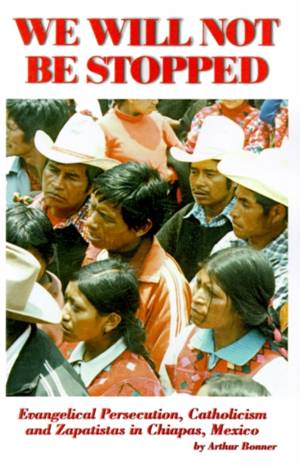
- Afhalen na 1 uur in een winkel met voorraad
- Gratis thuislevering in België vanaf € 30
- Ruim aanbod met 7 miljoen producten
- Afhalen na 1 uur in een winkel met voorraad
- Gratis thuislevering in België vanaf € 30
- Ruim aanbod met 7 miljoen producten
Zoeken
We Will Not Be Stopped
Evangelical Persecution, Catholicism, and Zapatismo in Chiapas, Mexico
Arthur Bonner
Paperback | Engels
€ 32,45
+ 64 punten
Omschrijving
The expulsion of at least 15,000 indigenous Mexicans from their lands and homes in the highlands of Chiapas is a text book illustration of this "complex brew". They were expelled when they accepted the Bible and refused to pay homage to what they saw as "idols" made by human hands -- the traditional village saints. In so doing, they challenged village leaders who were allied with Mexico's ruling political party. Were they being persecuted for their religious beliefs or for political reasons or, thirdly, for social reasons, in that they no longer accepted their traditional subservient roles? Whatever the exact cause, their expulsion continued for almost forty years and their cries for justice went unheard in Mexico and the United States as well.
As terrible as it is, there is a shortcoming in focusing on persecution alone. A narrow view of events in Chiapas may obscure the most significant lesson to be learned: the power of faith to sustain and enrich troubled individuals and to give purpose and direction to entire societies in their struggles for autonomy and cohesion.
Specificaties
Betrokkenen
- Auteur(s):
- Uitgeverij:
Inhoud
- Aantal bladzijden:
- 192
- Taal:
- Engels
Eigenschappen
- Productcode (EAN):
- 9781581128642
- Verschijningsdatum:
- 1/01/1998
- Uitvoering:
- Paperback
- Formaat:
- Trade paperback (VS)
- Afmetingen:
- 141 mm x 217 mm
- Gewicht:
- 272 g

Alleen bij Standaard Boekhandel
+ 64 punten op je klantenkaart van Standaard Boekhandel
Beoordelingen
We publiceren alleen reviews die voldoen aan de voorwaarden voor reviews. Bekijk onze voorwaarden voor reviews.











